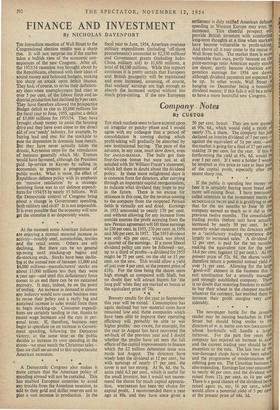FINANCE AND INVESTMENT
By NICHOLAS DAVENPORT THE immediate reaction of Wall Street to the Congressional election results was a sharp rise. It will not surprise me if the market takes a bullish view of the economic con- sequences of the new Congress. After all, the 1953/54 recession was brought about by the Republicans, obsessed with their ideas of sound money and balanced budgets, making too sharp an attack upon deficit finance. They had of course, to revise their deflation- ary ideas when unemployment had risen to over 5 per cent, of the labour force and in- dustrial production had declined by 9 per cent. They have therefore allowed the prospective Budget deficit to rise to $5,000 millions for the fiscal year to June, 1955, against a deficit Of $3,000 millions for 1953/54. They have brought cheap money to assist the housing drive and they have even come to the direct aid of one 'needy' industry, for example, by buying lead and zinc for the stockpile to ease the depression in domestic base metals. But they have never actually taken thern drastic, Keynesian steps for the stimulation of business generally which Mr. Truman would have favoured, although the President paid lip-service to Keynes by calling in economists to prepare a programme of public works, What is more, the effect of Republican defence policy with its emphasis pn 'massive retaliation' by a strategic bombing force was to cut defence expendi- tures for 1954/55 by nearly $5 billions. Will the Democratic control of Congress bring about a change in Government spending, o th military and civil? It is not impossible. t is even possible that the economy will now get the stimulus it so desperately wants.
At the moment some American industries are enjoying a normal seasonal increase in activity—notably steel, automobiles, textiles and the retail stores. Others are still declining. But there can be no general up-swing until stocking-up begins and de-stocking ends. Stocks have been declin- ing at the annual rate of between $3,000 and $4,000 millions—manufacturers' stocks are about $3,000 millions less than they were a year ago—and until this deflationary force Comes to an end there can be no sustained recovery. It may, indeed, be on the point of ending. An increase in demand in almost spy industry would now cause business men to revise their policy and a really big and sustained increase in sales would force them to begin stocking-up. Consumer expendi- tures are certainly tending to rise, thanks to recent wage increases and the cuts in per- sonal taxes. If, therefore, business men begin to speculate on an increase in Govern- ment spending, following the Democrat victory, at the same time as the public decides to increase its own spending in the stores—we must watch the Christmas sales— then we shall see an end to this unspectacular American recession.
* • A Democratic Congress also makes it more certain that the American policy of spending abroad will not be curtailed. This has enabled European countries to avoid any trouble from the American recession, to add to their gold and dollar reserves and to plan a vast increase in production. In the fiscal year to June, 1954, American overseas military expenditures (including 'off-shore procurements') amounted to $2,530 and Government grants (including Indo- China military aid) to $1,650 millions, a total of $4,180 millions. While this support continues it is pretty certain that European and British prosperity will be maintained and even increased, assuming, of course, that workers' earnings are high enough to absorb the increased output without too much price-cutting. If the new European settlement is duly ratified American defend/ spending in Western Europe may even I:1, increased. This cheerful prospect wiu provide British investors with comforting long-term thoughts at a time when markets have become vulnerable to profit-taking; And above all it may come to the rescue el Wall Street bulls. The market there is mord vulnerable than ours, partly because on the price-earnings ratio American equity stocks are dearer, partly because American col' poration earnings for 1954 are down, although dividend payments are expected to be up. In other words, Wall Street is hanging on December being a bountiful dividend season: if this fails it will be a relief to have a more bountiful new Congress.


































 Previous page
Previous page